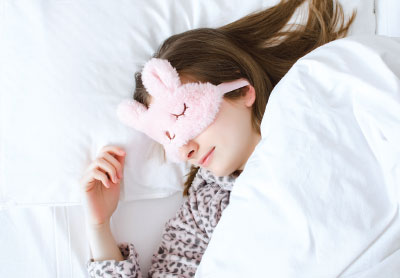Maintaining Regular Sleep-Wake Schedule During Pandemic May Help Adolescents
Abstract
Despite COVID-19–related anxiety and uncertainty, teenagers may be getting more sleep while schools are closed.

Adolescents are just one of the many groups of U.S. students whose education has swiftly transitioned into online learning environments to attempt to slow the spread of COVID-19. Disconnected from friends and without the structure of a full day of school, youth with anxiety and mood disorders may experience a worsening of symptoms.
One way to help these youth, says Leslie Miller, M.D., an assistant professor of psychiatry and behavioral sciences at the Johns Hopkins Medical Institutions (JHMI) and director of the JHMI Mood Disorders in Adolescents and Young Adults Program, is to encourage them to keep a regular sleep and exercise schedule.
Adolescents with anxiety disorders who avoid social interactions at school may feel better temporarily while at home, she said. Those who have been working to develop friendships, however, may find this task even harder while staying home since they can’t approach others in person. Others fear that school will never reopen, they’ll have to stay home forever, and the world will never get back to normal, she said. These youngsters benefit from both reassurance that the pandemic will not go on indefinitely and help in achieving a more balanced perspective.
Adolescents with mood disorders also may find it harder while not in school to maintain social connections that help keep their mood stable, she said. Since their days often lack structure, they may drift into becoming extreme night owls, going to bed as late as 4 a.m. and sleeping until the afternoon.
Communicating with her patients using telemedicine as well as telephone calls, Miller asks them, “Have you noticed your mood has changed? What about your motivation and energy?” Patients frequently report their mood has worsened, she said. She’s seen increased suicidal ideation in some.
Miller said she regularly encourages these adolescents to avoid napping in the daytime and try to move their bedtime an hour or two earlier, closer to an appropriate time once school restarts. “Teens need to buy into this to make the change,” she said. While it helps to have parents aware of problems caused by lack of structure, she cautions parents against trying to set firm bedtimes for adolescents, a potential battleground.
Organizing the day to include exercise—outside, if possible—benefits the sleep/wake schedule, she noted. If adolescents live near a friend, they can walk and talk while maintaining a six-foot distance.
Sleep Tips for Teens
Mary Carskadon, Ph.D., a professor of psychiatry and human behavior at the Alpert Medical School of Brown University and director of chronobiology and sleep research at the E.P. Bradley Hospital in Providence, R.I., suggests teens use these tactics to optimize sleep while schools remain closed:
Set a bedtime that allows nine to 10 hours of sleep each night and try to stick to it.
Get daylight exposure every morning on awakening to keep your internal clock on time.
Avoid caffeine and napping within six hours of bedtime.
Relax for about 30 minutes before bedtime.
Avoid bright or intense light before bedtime to keep your internal clock from moving later.
Turn off your computer, TV, and other technology in your bedroom before going to bed.
Put your phone on “Do not disturb” at bedtime.
Have some fun every day and enjoy life!
Many adolescents report feeling lonely while schools are closed, Rafael Pelayo, M.D., a clinical professor of psychiatry and behavioral sciences at the Stanford University Center for Sleep Sciences and Medicine, told Psychiatric News. Also, it’s hard to carry on young romances virtually, he noted. Some teens have lost their jobs and hence, income. Others, working in grocery stores or carry-out restaurants, worry about health risks.
Parents may be tempted to let adolescents sleep as late as they wish, said Pelayo, president-elect of the California Sleep Society. Teens will feel and function better, he said, if they stick to a bedtime and rise time that do not fluctuate by two hours or more from day to day.
Many teens seeking privacy at home spend most of their waking hours in their bedrooms, a habit that promotes staying up later. Pelayo teaches 220 undergraduates in his Stanford University Sleep and Dreams course using a videoconferencing app. While in-person classes include demonstrations, he now only lectures, he said. In lieu of required outreach projects, such as giving talks at local schools, students prepare videos. Keeping classes going in colleges and high schools, Pelayo said, helps maintain normality and encourage adaptive coping strategies.
“It’s crucial to instill in students the sense that this will pass,” Pelayo said. “As with the AIDS crisis in the 70s, society rebounded and will do so again.”
Families across the United States and around the world have reported to Start School Later Inc., a national nonprofit focusing on healthy school start times, that school closures have a silver lining, Terra Ziporyn Snider, the group’s executive director, told Psychiatric News. Despite pandemic-related anxiety and uncertainty, she said, parents report their teenagers get more sleep now and are happier, more communicative, and less moody.
Teachers and parents see it’s possible to hold classes online and on a flexible schedule, she noted. “I hope the memory that we don’t have to do things the way we always did will carry over when things return to normal,” she said. “Sometimes it takes a crisis to prompt change.” ■



